- Home
- Fergus Hume
The Bishop's Secret Page 24
The Bishop's Secret Read online
Page 24
CHAPTER XXIV
THE BISHOP ASSERTS HIMSELF
On being left alone, the bishop sat motionless in his chair for someconsiderable time. The information conveyed by Cargrim struck at hispride, but in his heart he knew well that he had as little right to beproud as to resent the blow. Casting a look over the past, he saw thatDr Graham had been right in his reference to the Ring of Polycrates, foralthough he was outwardly still prosperous and high-placed, shame hadcome upon him, and evil was about to befall. From the moment ofJentham's secret visit a blight had fallen on his fortunes, a curse hadcome upon his house, and in a thousand hidden ways he had been tortured,although for no fault of his own. There was his secret which he did notdare even to think of; there was the enforced absence of his wife anddaughter, whom he had been compelled to send away; there was the hiddenenmity of Cargrim, which he did not know how to baffle; and now therewas the shame of Gabriel's engagement to a barmaid; of George's choiceof a wife, who, if rumour could be believed, was the daughter of ascoundrel. With these ills heaped upon his head, the bishop did not knowhow he could ever raise it again.
Still, all these woes were locked up in his own breast, and to the worldhe was yet the popular, prosperous Bishop of Beorminster. Thisimpression and position he was resolved to maintain at all costs,therefore, to put an end to his last trouble, he concluded to speakseriously to his sons on the subject of unequal marriages. A pressure ofthe electric button summoned the servant, who was instructed to requestCaptain Pendle and Mr Gabriel to see their father at once in thelibrary. It would seem as though they almost expected the message, forin a few minutes they were both in the room; George, with his usualjaunty, confident air, but Gabriel with an anxious look. Yet neither ofthe young men guessed why the bishop had sent for them; least of allGeorge, who never dreamed for a moment that his father would oppose hisengagement with Mab Arden.
'Sit down, both of you,' said Dr Pendle, in grave tones, 'I havesomething serious to say,' and the bishop took up an imposing positionon the hearthrug. The two sons looked at one another.
'There is no bad news from Nauheim, I hope, sir?' said George, quiteignorant of the meaning of this exordium.
'No. Lucy's last letter about your mother was very cheerful indeed. Iwish to speak seriously to both of you. As you are the elder, George, Ishall begin with you; Gabriel, I shall reason with later.'
'Reason with me,' wondered the curate. 'Have I been doing anything whichrequires me to be reasoned with?' and he gave a half smile, neverthinking how soon his jest would be turned into bitter earnest.
'I think a word in season will do you no harm,' answered his father,austerely, 'but I shall address myself to George first.'
'I am all attention, sir,' said the captain, rather weary of thissolemnity. 'What have I done?'
'You have concealed from me the fact of your engagement to Miss Arden.'
'Oh!' cried George, smiling, 'so Miss Whichello has been speaking!'
'Yes, she spoke to me to-day, and told me that you had formally engagedyourself to her niece without my knowledge or sanction. May I inquireyour reason for so singular a course?'
'Is it singular, sir?' asked George, in a half-joking tone. 'I alwaysunderstood that it was first necessary to obtain the lady's consentbefore making the matter public. I asked Mab to be my wife when I lastvisited Beorminster, and I intended to tell you of it this time, but Ifind that Miss Whichello has saved me the trouble. However, now that youknow the truth, sir,' said Captain Pendle, with his sunny smile, 'may Iask for your approval and blessing?'
'You may ask,' said the bishop, coldly, 'but you shall have neither.'
'Father!' The answer was so unexpected that George jumped up from hischair with a cry of surprise, and even Gabriel, who was in the secret ofhis brother's love for Mab, looked astonished and pained.
'I do not approve of the engagement,' went on the bishop, imperturbably.
'You--do--not--approve--of--Mab!' said Captain Pendle, slowly, and hisface became pale with anger.
'I said nothing about the lady,' corrected the bishop, haughtily; 'youwill be pleased, sir, to take my words as I speak them. I do not approveof the engagement.'
'On what grounds?' asked George, quietly enough.
'I know nothing about Miss Arden's parents.'
'She is the daughter of Miss Whichello's sister.'
'I am aware of that, but what about her father?'
'Her father!' repeated George, rather perplexed. 'I never inquired abouther father; I do not know anything about him.'
'Indeed!' said the bishop, 'it is just as well that you do not.'
Captain Pendle looked disturbed. 'Is there anything wrong with him?' heasked nervously. 'I thought he was dead and buried ages ago.'
'I believe he is dead; but from all accounts he was a scoundrel.'
'From whose account, bishop?'
'Mrs Pansey's for one.'
'Father!' cried Gabriel, 'surely you know that Mrs Pansey's gossip ismost unreliable.'
'Not in this instance,' replied the bishop, promptly. 'Mrs Pansey toldme some twenty-six years ago, when Miss Whichello brought her niece tothis city, that the child's father was little better than a gaol-bird.'
'Did she know him?' asked George, sharply.
'That I cannot say, but she assured me that she spoke the truth. I paidno attention to her talk, nor did I question Miss Whichello on thesubject. In those days it had no interest for me, but now that I find myson desires to marry the girl, I must refuse my consent until I learnall about her birth and parentage.'
'Miss Whichello will tell us about that!' said George, hopefully.
'Let us trust that Miss Whichello dare tell us.'
'Dare, sir!' cried Captain Pendle, gnawing his moustache.
'I used the word advisedly, George. If what Mrs Pansey asserts is true,Miss Whichello will feel a natural reluctance to confess the truth aboutMiss Arden's father.'
'Admitting as much,' urged Gabriel, seeing that George kept silent,'surely you will not visit the sins of the father on the innocentchild?'
'It is scriptural law, my son.'
'It is not the law of Christ,' replied the curate.
'Law or no law!' said Captain Pendle, determinedly, 'I shall not giveMab up. Her father may have been a Nero for all I care. I marry hisdaughter all the same; she is a good, pure, sweet woman.'
'I admit that she is all that,' said the bishop, 'and I do not want youto give her up without due inquiry into the matter of which I speak. Butit is my desire that you should return to your regiment until the affaircan be sifted.'
'Who should sift it but I?' inquired George, hotly.
'If you place it in my hands all will--I trust--be well, my son. I shallsee Miss Whichello and Mrs Pansey and learn the truth.'
'And if the truth be as cruel as you suspect?'
'In that case,' said the bishop, slowly, 'I shall consider the matter;you must not think that I wish you to break off your engagementaltogether, George, but I desire you to suspend it, so to speak. For thereasons I have stated, I disapprove of your marrying Miss Arden, but itmay be that, should I be informed fully about her father, I may changemy mind. In the meantime, I wish you to rejoin your regiment and remainwith it until I send for you.'
'And if I refuse?'
'In that case,' said the bishop, sternly, 'I shall refuse my consentaltogether. Should you refuse to acknowledge my authority I shall treatyou as a stranger. But I have been a good father to you, George, and Itrust that you will see fit to obey me.'
'I am not a child,' said Captain Pendle, sullenly.
'You are a man of the world,' replied his father, skilfully, 'and assuch must see that I am speaking for your own good. I ask merely fordelay, so that the truth may be known before you engage yourselfirrevocably to this young lady.'
'I look upon my engagement as irrevocable! I have asked Mab to be mywife, I have given her a ring, I have won her heart; I should be a meanhound,' cried George, lashing himself into a rage, 'if I gave
her up forthe lying gossip of an old she-devil like Mrs Pansey.'
'Your language is not decorous, sir.'
'I--I beg your pardon, father, but don't be too hard on me.'
'Your own good sense should tell you that I am not hard on you.'
'Indeed,' put in Gabriel, 'I think that my father has reason on hisside, George.'
'You are not in love,' growled the captain, unconvinced.
A pale smile flitted over Gabriel's lips, not unnoticed by the bishop,but as he purposed speaking to him later, he made no remark on it at themoment.
'What do you wish me to do, sir?' asked George, after a pause.
'I have told you,' rejoined the bishop, mildly. 'I desire you to rejoinyour regiment and not come back to Beorminster until I send for you.'
'Do you object to my seeing Mab before I go?'
'By no means; see both Miss Arden and Miss Whichello if you like, andtell them both that it is by my desire you go away.'
'Well, sir,' said Captain Pendle, slowly, 'I am willing to obey you andreturn to my work, but I refuse to give up Mab,' and not trustinghimself to speak further, lest he should lose his temper altogether, heabruptly left the room. The bishop saw him retire with a sigh and shookhis head. Immediately afterwards he addressed himself to Gabriel, who,with some apprehension, was waiting for him to speak.
'Gabriel,' said Dr Pendle, picking up a letter, 'Harry has written to mefrom Nauheim, saying that he is compelled to return home on business. AsI do not wish your mother and Lucy to be alone, it is my desire that youshould join them--at once!'
The curate was rather amazed at the peremptory tone of this speech, buthastened to assure his father that he was quite willing to go. Thereason given for the journey seemed to him a sufficient one, and he hadno suspicion that his father's real motive was to separate him fromBell. The bishop saw that this was the case, and forthwith came to theprincipal point of the interview.
'Do you know why I wish you to go abroad?' he asked sharply.
'To join my mother and Lucy--you told me so.'
'That is one reason, Gabriel; but there is another and more importantone.'
A remembrance of his secret engagement turned the curate's face crimson;but he faltered out that he did not understand what his father meant.
'I think you understand well enough,' said Dr Pendle, sternly. 'I alludeto your disgraceful conduct in connection with that woman at The DerbyWinner.'
'If you allude to my engagement to Miss Mosk, sir,' cried Gabriel, withspirit, 'there is no need to use the word disgraceful. My conducttowards that young lady has been honourable throughout.'
'And what about your conduct towards your father?' asked the bishop.
Gabriel hung his head. 'I intended to tell you,' he stammered, 'when--'
'When you could summon up courage to do so,' interrupted Dr Pendle, incutting tones. 'Unfortunately, your candour was not equal to yourcapability for deception, so I was obliged to learn the truth from astranger.'
'Cargrim!' cried Gabriel, his instinct telling him the name of hisbetrayer.
'Yes, from Mr Cargrim. He heard the truth from the lips of this girlherself. She informed him that she was engaged to marry you--you, myson.'
'It is true!' said Gabriel, in a low voice. 'I wish to make her mywife.'
'Make her your wife!' cried Dr Pendle, angrily; 'this commongirl--this--this barmaid--this--'
'I shall not listen to Bell being called names even by you, father,'said Gabriel, proudly. 'She is a good girl, a respectable girl--abeautiful girl!'
'And a barmaid,' said the bishop, dryly. 'I congratulate you on thedaughter-in-law you have selected for your mother!'
Gabriel winced. Much as he loved Bell, the idea of her being in thesociety of his delicate, refined mother was not a pleasant one. He couldnot conceal from himself that although the jewel he wished to pick outof the gutter might shine brilliantly there, it might not glitter somuch when translated to a higher sphere and placed beside more polishedgems. Therefore, he could find no answer to his father's speech, andwisely kept silence.
'Certainly, my sons are a comfort to me!' continued the bishop,sarcastically. 'I have brought them up in what I judged to be a wise andjudicious manner, but it seems I am mistaken, since the first use theymake of their training is to deceive the father who has never deceivedthem.'
'I admit that I have behaved badly, father.'
'No one can deny that, sir. The question is, do you intend to continuebehaving badly?'
'I love Bell dearly--very dearly!'
The bishop groaned and sat down helplessly in his chair. 'It isincredible,' he said. 'How can you, with your refined tastes andup-bringing, love this--this--? Well, I shall not call her names. Nodoubt Miss Mosk is well enough in her way, but she is not a proper wifefor my son.'
'Our hearts are not always under control, father.'
'They should be, Gabriel. The head should always guide the heart; thatis only common sense. Besides, you are too young to know your own mind.This girl is handsome and scheming, and has infatuated you in yourinnocence. I should be a bad father to you if I did not rescue you fromher wiles. To do so, it is my intention that you shall go abroad for atime.'
'I am willing to go abroad, father, but I shall never, never forgetBell!'
'You speak with all the confidence of a young man in love for the firsttime, Gabriel. I am glad that you are still sufficiently obedient toobey me. Of course, you know that I cannot consent to your making thisgirl your wife.'
'I thought that you might be angry,' faltered Gabriel.
'I am more hurt than angry,' replied the bishop. 'Have you given thisyoung woman a promise of marriage?'
'Yes, father; I gave her an engagement ring.'
'I congratulate you, sir, on your methodical behaviour. However, it isno use arguing with one so infatuated as you are. All I can do is totest your affection by parting you from Miss Mosk. When you return fromNauheim we shall speak further on the subject.'
'When do you wish me to go, father?' asked Gabriel, rising submissively.
'To-morrow,' said the bishop, coldly. 'You can leave me now.'
'I am sorry--'
'Sorry!' cried Dr Pendle, with a frown. 'What is the use of wordswithout deeds? Both you and George have given me a sore heart this day.I thought that I could trust my sons; I find that I cannot. If-- But itis useless to talk further. I shall see what absence can do in bothcases. Now leave me, if you please.'
The bishop turned to his desk and busied himself with some papers, whileGabriel, after a moment's hesitation, left the room with a deep sigh. DrPendle, finding himself alone, leaned back in his chair and groanedaloud.
'I have averted the danger for the time being,' he said sadly, 'but thefuture--ah, me! what of the future?'

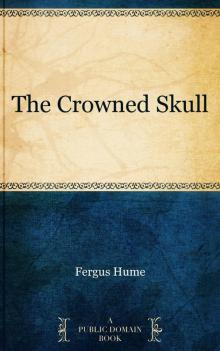 The Crowned Skull
The Crowned Skull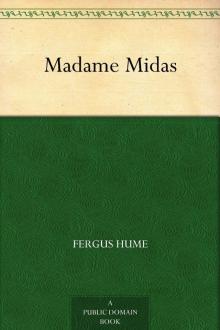 Madame Midas
Madame Midas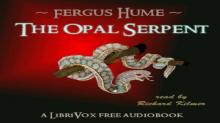 The Opal Serpent
The Opal Serpent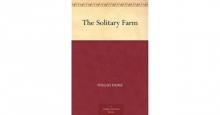 The Solitary Farm
The Solitary Farm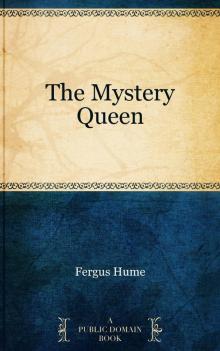 The Mystery Queen
The Mystery Queen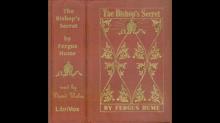 The Bishop's Secret
The Bishop's Secret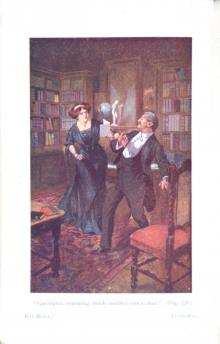 Red Money
Red Money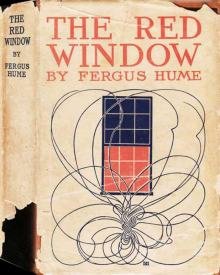 The Red Window
The Red Window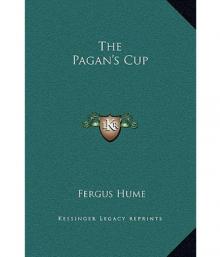 The Pagan's Cup
The Pagan's Cup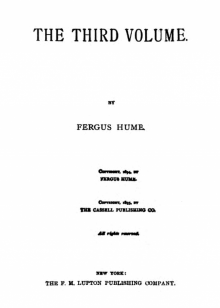 The Third Volume
The Third Volume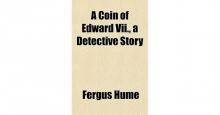 A Coin of Edward VII: A Detective Story
A Coin of Edward VII: A Detective Story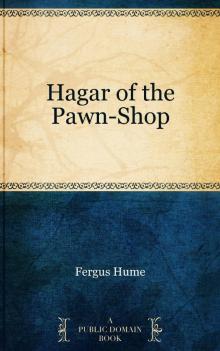 Hagar of the Pawn-Shop
Hagar of the Pawn-Shop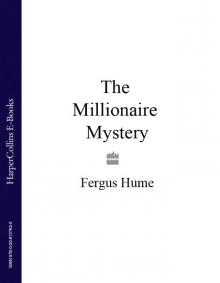 The Millionaire Mystery
The Millionaire Mystery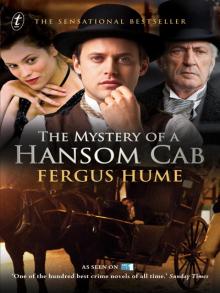 The Mystery of a Hansom Cab
The Mystery of a Hansom Cab